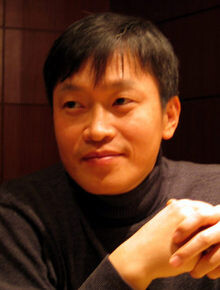hankyoreh
Links to other country sites 다른 나라 사이트 링크
“The Art of War” from Hu to Bush
By Lee Sang-soo, Beijing Correspondent

In his visit to Washington on April 20, the Chinese President Hu Jintao gave copies of "The Art of War," written by the ancient Chinese general Sun Tzu, to George Bush and his aides. The gift, comprised of both English and Chinese versions, was prepared by the Foreign Languages Press (FLP), an umbrella group of the Chinese State Council.
What Bush received was a bit more special than the others in that his version was more of a work of art than a book. The Chinese version, probably now resting on a White House bookshelf somewhere, is of light purple silk thread woven on another piece of pure silk, the fabric from China's Zhejiang Province, its historical place of origin.
The book’s making was said to involve 55,000 threads of mulberry silk and 200 million meticulously interwoven fibers. The English copy was also done on silk, and the dual volumes were delivered in an elegant box made of delicate red walnut. One can imagine how much care and effort went into the gift.
But why did Hu Jintao choose, among many Chinese classics, "The Art of War"? The Hong Kong media, including Ming Pao News, interpreted that it was because the book contains the idea of "winning without fighting as supreme excellence." Such an interpretation seems reasonable.
The reason that Sun Tzu would believe that military excellence consists of breaking the enemy's resistance without fighting is due to the fact that, as a philosopher, he saw through the nature of war due to the brutal battles he had endured.
Sun Tzu said, "In the practical art of war, the best thing is to take the enemy's country whole and intact; to shatter and destroy it is not good." He also said, "The worst policy of all is to besiege walled cities." He argued that attacking walled cities could amount to a "disaster."
This all sounds more like anti-war rhetoric than the text of a book called "The Art of War." As a matter of fact, Johan Galtung, a renowned scholar of peace studies, called Sun Tzu the "founder of peace studies."
Sun Tzu's insight goes far with current U.S. foreign policy, which is currently mired in the Iraq War. Instead of working on Iraq with persuasion, the U.S. tried to "shatter its cities and destroy the country," in the words of Sun Tzu . As a result, the U.S. military in Baghdad now faces the nightmare of suicide bombings, which happen anytime, anywhere.
Having long forgotten the lessons of the Vietnam War, the U.S. hasn't learned a lesson from Iraq, either. And now it is facing off with Iran using the same attitude of "shatter and destroy."
President Bush and his advisors were naive enough to believe they would have a compliant Iraq after toppling the Saddam Hussein regime and holding democratic elections. However, as history tells us, democratic reform is a complicated and extremely difficult process in any country.
Nonetheless, Washington is again considering the same option with Iran, which according to Sun Tzu is "the lowest-level strategy." Is America's goal to oust Iranian President Ahmadinejad or to end the religious rule of Iran's supreme leader, Ayatollah Khamenei? As illustrated in Iraq, either outcome would most likely amount to another disaster.
Dear President Bush, please try to think about what the ancient Chinese strategist would tell you if he were your advisor; do so while you are reading "the Art of War." Perhaps this was the message behind Hu Jintao's gift. Perhaps he hoped that Bush and his advisors are wise enough to not treat the little silk book as a pearl cast before swine.
Editorial・opinion
![[Column] Season 2 of special prosecutor probe may be coming to Korea soon [Column] Season 2 of special prosecutor probe may be coming to Korea soon](https://flexible.img.hani.co.kr/flexible/normal/500/300/imgdb/original/2024/0426/3317141030699447.jpg) [Column] Season 2 of special prosecutor probe may be coming to Korea soon
[Column] Season 2 of special prosecutor probe may be coming to Korea soon![[Column] Park Geun-hye déjà vu in Yoon Suk-yeol [Column] Park Geun-hye déjà vu in Yoon Suk-yeol](https://flexible.img.hani.co.kr/flexible/normal/500/300/imgdb/original/2024/0424/651713945113788.jpg) [Column] Park Geun-hye déjà vu in Yoon Suk-yeol
[Column] Park Geun-hye déjà vu in Yoon Suk-yeol- [Editorial] New weight of N. Korea’s nuclear threats makes dialogue all the more urgent
- [Guest essay] The real reason Korea’s new right wants to dub Rhee a founding father
- [Column] ‘Choson’: Is it time we start referring to N. Korea in its own terms?
- [Editorial] Japan’s rewriting of history with Korea has gone too far
- [Column] The president’s questionable capacity for dialogue
- [Column] Are chaebol firms just pizza pies for families to divvy up as they please?
- [Column] Has Korea, too, crossed the Rubicon on China?
- [Correspondent’s column] In Japan’s alliance with US, echoes of its past alliances with UK
Most viewed articles
- 1Why Kim Jong-un is scrapping the term ‘Day of the Sun’ and toning down fanfare for predecessors
- 2After election rout, Yoon’s left with 3 choices for dealing with the opposition
- 3Two factors that’ll decide if Korea’s economy keeps on its upward trend
- 4‘We must say no’: Seoul defense chief on Korean, USFK involvement in hypothetical Taiwan crisis
- 5AI is catching up with humans at a ‘shocking’ rate
- 6Noting shared ‘values,’ Korea hints at passport-free travel with Japan
- 746% of cases of violence against women in Korea perpetrated by intimate partner, study finds
- 8Why Korea shouldn’t welcome Japan’s newly beefed up defense cooperation with US
- 9Amnesty notes ‘erosion’ of freedom of expression in Korea in annual human rights report
- 10Ethnic Koreans in Japan's Utoro village wait for Seoul's help